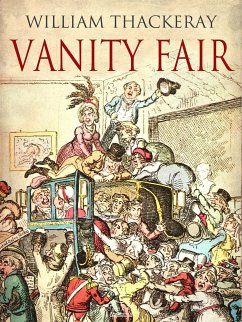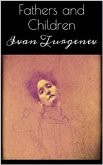Vanity Fair is an English novel by William Makepeace Thackeray which follows the lives of Becky Sharp and Emmy Sedley amid their friends and families during and after the Napoleonic Wars. It was first published as a 19-volume monthly serial from 1847 to 1848, carrying the subtitle Pen and Pencil Sketches of English Society, reflecting both its satirisation of early 19th-century British society and the many illustrations drawn by Thackeray to accompany the text. It was published as a single volume in 1848 with the subtitle A Novel without a Hero, reflecting Thackeray's interest in deconstructing his era's conventions regarding literary heroism. It is sometimes considered the "principal founder" of the Victorian domestic novel.
The story is framed as a puppet play and the narrator, despite being an authorial voice, is notoriously unreliable. Late in the narrative, it is revealed that the entire account has been 2nd- or 3rd-hand gossip the writer picked up "years ago" from Lord Tapeworm, British charge d'affaires in one of the minor German states and relative of several of the other aristocrats in the story but none of the main characters: "the famous little Becky puppet", "the Amelia Doll", "the Dobbin Figure", "the Little Boys", and "the Wicked Nobleman, on which no expense has been spared". Despite her many stated faults and still worse ones admitted to have been passed over in silence, Becky emerges as the "hero"—what is now called an antihero—in place of Amelia because Thackeray is able to illustrate that "the highest virtue a fictional character can possess is interest."
The serial was a popular and critical success; the novel is now considered a classic and has inspired several film adaptations. In 2003, Vanity Fair was listed at No. 122 on the BBC's The Big Read poll of the UK's best-loved books.
The story is framed as a puppet play and the narrator, despite being an authorial voice, is notoriously unreliable. Late in the narrative, it is revealed that the entire account has been 2nd- or 3rd-hand gossip the writer picked up "years ago" from Lord Tapeworm, British charge d'affaires in one of the minor German states and relative of several of the other aristocrats in the story but none of the main characters: "the famous little Becky puppet", "the Amelia Doll", "the Dobbin Figure", "the Little Boys", and "the Wicked Nobleman, on which no expense has been spared". Despite her many stated faults and still worse ones admitted to have been passed over in silence, Becky emerges as the "hero"—what is now called an antihero—in place of Amelia because Thackeray is able to illustrate that "the highest virtue a fictional character can possess is interest."
The serial was a popular and critical success; the novel is now considered a classic and has inspired several film adaptations. In 2003, Vanity Fair was listed at No. 122 on the BBC's The Big Read poll of the UK's best-loved books.
"I do not say there is no character as well drawn in Shakespeare [as D'Artagnan]. I do say there is none that I love so wholly."
--Robert Louis Stevenson
"The lasting and universal popularity of The Three Musketeers shows that Dumas, by artlessly expressing his own nature in the persons of his heroes, was responding to that craving for action, strength and generosity which is a fact in all periods and all places."
--Andreé Maurois
--Robert Louis Stevenson
"The lasting and universal popularity of The Three Musketeers shows that Dumas, by artlessly expressing his own nature in the persons of his heroes, was responding to that craving for action, strength and generosity which is a fact in all periods and all places."
--Andreé Maurois

William Makepeace Thackeray "Jahrmarkt der Eitelkeit"
In diesem berühmtesten seiner Romane (später hat er wohl noch bessere geschrieben, aber andrerseits keinen mehr mit einem so großartigen Titel: "Jahrmarkt der Eitelkeit" - ein Weltentwurf in einem Wort) schildert William Thackeray die Lebenswege zweier junger Frauen aus der besseren Gesellschaft: Die eine hat einen schönen Charakter, eine mitfühlende Seele, und wenn das Schicksal ihr nicht wohlwill, wartet sie bescheiden ab, und der Autor liebt sie. Die andre ist brillant und schön, sie setzt sich um jeden Preis durch, und wenn jemand gegen sie ist, sucht sie sich als Abenteurerin den Weg zu den Zielen, die sie will, und Thackeray wäre ein übler Autor, wenn er sie nicht liebte, und dafür wieder lieben wir ihn, fast noch mehr als vorher, denn das war kein Kunststück. Mehr aber liebt Thackeray (er lebte von 1811 bis 1863, er hat als junger Mensch den alten Goethe besucht und ihn gezeichnet, später konnte er sich nicht recht damit abfinden, daß nun Eisenbahnen fuhren, wo er noch Kutschen benutzt hatte) doch die stille Schönheit, den inneren Glanz: und mit unendlicher Gelassenheit kundschaftet er nun für uns und besonders eben für die demütig-liebe Amelia aus, wie Gott es wohl fertigbringt, daß zwar das Böse Raum in der Welt gewinnt, das Gute aber auch nicht untergeht (Thackeray war ein Schiller-Fan). Becky, die schöne Abenteurerin, erbt und kriegt schließlich, was sie will, Amelie, die liebe Gute, verliert zwar ihren Mann, der ohnehin ein Schuft war, kriegt dafür aber ihren treuesten Anbeter, einen etwas älteren Typ, aber mit Seele. Dickens, der ebenfalls diesen Hang zu blonder Seelenschönheit hatte, ging seit diesem Buch ein wenig auf Distanz zu seinem Freund: Er gönnte ihm Erfolg, gewiß, aber nicht so einen gewaltigen, fast schon gottlos ihm abträglichen womöglich. (William Makepeace Thackeray: "Jahrmarkt der Eitelkeit". Ein Roman ohne einen Helden. Aus dem Englischen übersetzt von Elisabeth Schnack. Mit 188 Illustrationen des Autors. Manesse Verlag, Zürich. 1155 S., geb., 52,20 DM; auch im Insel Verlag, herausgegeben von Norbert Kohl unter Zugrundelegung einer Übersetzung aus dem Nachlaß von Röhl, Frankfurt am Main 1980. 1166 S., br., 38,80 DM). R.V.
Alle Rechte vorbehalten. © F.A.Z. GmbH, Frankfurt am Main









